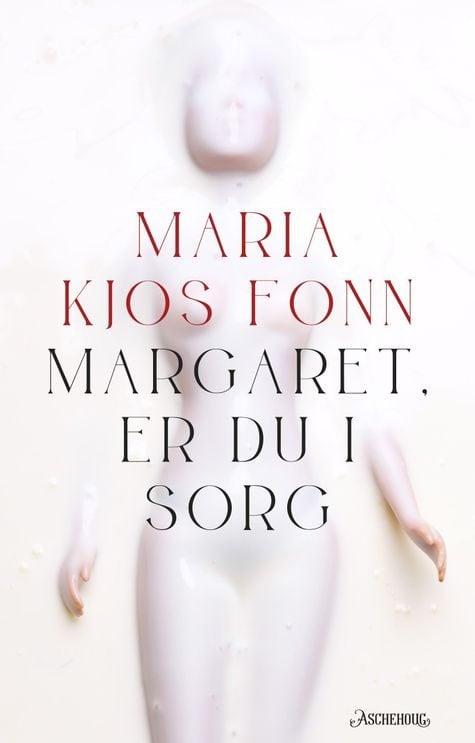“A powerful novel about suicide, grief, and guilt, and the path into madness. In a crystal-clear, elegant prose, the novel revolves around losing oneself… (…) It is strong, it is eerie and captivating, the language vibrates both elastically and tensely, making the serious text soar. [Fonn’s] eye for human imperfection and strength is sharp and investigative. (…) Young Maria Kjos Fonn is well on her way into an important literary career with her novels about addiction, outsiders, and now about death and life in a deeply probing manner.”
6/6 stars, Adresseavisen
“Kjos Fonn masterfully depicts the development from a good girl to an unbearable horror patient who knows best, can do everything, and mocks everyone who tries to help. (…) Above all, it is a shocking portrayal of a person who is falling apart. The language is compelling; cool, well-tempered, and volcanic all at once, depending on the scene and situation; simple, sometimes sparse, but precise and effective, with original metaphors. (…) Maria Kjos Fonn succeeds very well in bringing out Margaret’s fragility and sorrow, which she sometimes sprinkles, sometimes slams across the pages, drawing a convincing portrait of a young woman who simultaneously wants to live and die. It is shocking and touching… (…) Maria Kjos Fonn is on her way to becoming a significant figure in Norwegian literature.”
5/6 stars, Sigmund Jensen, Stavanger Aftenblad
“Truly powerful reading. Maria Kjos Fonn writes well about turning painful emotions into actions. (…) The poetic language with its linguistic imagery is subordinated to an intense story of downfall. (…) Few write so brutally about making everything difficult and ethereal in life into something completely concrete and tangible in all the wrong ways. (…) In Maria Kjos Fonn’s books, self-destructive intoxication and deadly violence meet in a concise and vivid language. The depictions of the brutal experience of grief that Margaret undergoes are truly powerful reading”
Eilif Guldvog Hartvedt, Aftenposten
“Maria Kjos Fonn is ruthlessly good in her depiction of the mindset of the suicidal and those left behind. (…) Particularly successful is Fonn’s alternation between giving voice to Margaret at six years old and Margaret in the present, where the author, in poetically sharp descriptions, also gives voice to the unruly nature of the psyche. (…) With an unsentimental, precise prose and a clear authority, she writes about grief and guilt both from the child’s perspective and from the standpoint of the sick medical student.”
Margunn Vikingstad, Morgenbladet
“The pain is so pulsatingly fresh, the language so dramatic and vivid, in a way both colorful and pitch-black at the same time. (…) She has an artistic sensibility that approaches the gothic, dramatic and youthful in all its feverish, hallucinatory intensity. (…) And despite all the darkness, the book does not collapse into nihilism. Rather, in the end, we are dealing with a novel about reconciliation and healing, about the possibility of piecing together a new reality, a new life, after everything has been torn apart.”
Leif Bull, DN
‘“Maria Kjos Fonn is as dark as she is funny in her third novel. (…) Maria Kjos Fonn’s language is good and vivid. Besides the lively scenes from childhood – which are so accurate from the child’s perspective that they are truly heart-wrenching – the novel’s strength lies in its often weighty reflection on the material. (…) a thought-provoking story about death whispering from the shadows.”
5/6 stars, Thula Kopreitan, NRK
“Maria Kjos Fonn sharply and closely circles how unresolved grief after a mother who takes her own life can catch up with a person after many years. (…) Margaret, Are You Grieving showcases a competent literary voice that elegantly blends lyrical and dreamlike sequences with variations on familiar fairy tales. She delivers precise sentences that tempt quoting. (…) A brutal story, unsentimentally conveyed through a child’s eyes. A significant additional quality of the novel is that it allows the narrator to reflect so bravely on suicide as an act from a moral and philosophical standpoint. These thoughts are convincingly woven into the text and narrative.”
Turid Larsen, Dagsavisen
“Maria Kjos Fonn’s new novel examines suicide with a fearless yet vulnerable gaze. (…) With this year’s novel, Maria Kjos Fonn has once again proven how literature can expose vulnerable and complicated lives, without romanticizing, but with a poetic nerve that brings to life the stories we so often look away from.”
Sigrid Elise Strømmen, Vårt Land

